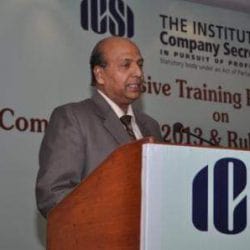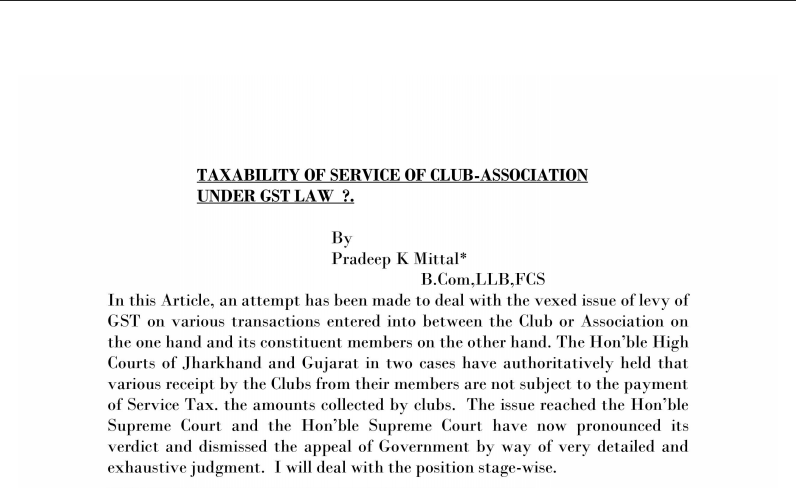Taxability of Service of Club-Association Under GST Law?
Table of Contents
Taxability of Service of Club-Association Under GST Law?
In this article, an attempt has been made to deal with the vexed issue of levy of GST on various transactions entered into between the Club or Association on the one hand and its constituent members on the other hand. The Hon‘ble High Courts of Jharkhand and Gujarat in two cases have authoritatively held that various receipt by the Clubs from their members is not subject to the payment of Service Tax. the amounts collected by clubs. The issue reached the Hon‘ble Supreme Court and the Hon‘ble Supreme Court have now pronounced its verdict and dismissed the appeal of Government by way of very detailed and exhaustive judgment. I will deal with the position stage–wise.
Position Prior To 1.7.2012
2: Let me first deal with the period prior to 1.7.2012, there were two landmark judgment one Jharkhand High Court in Ranchi Club Ltd. vs. Commissioner of Customs (MANU/JH/0270/2012 and another Gujarat High Court in Sports Club Gujarat Ltd. vs. UOI (MANU/GJ/0387/2013 were followed by various benches of Customs Excise & Service Tax Tribunal (hereinafter called CESTAT) holding that the amounts collected by clubs from their own members are not liable to service tax as there is no service provider and no service recipient relationship. For any transaction to be subject to Service Tax, obviously, therefore, there has to be a service provider and service recipient.
Position Subsequent To 1.7.2012
3: After 1.7.2012, negative service tax regime came into being, there is a judgment of Madras High Court in Ootacamund Club Ltd Vs. CST MANU/TN/9586/2019 (Date of judgment dt.17.12.2019), while dealing with the case of petitioner company which is incorporated under Section 25 Companies
Act, 1956, in relation to SCN covering the period 1.10.2008 to 31.1.2014 has quashed the demand of Service Tax confirmed on account of (i) subscription and (ii) usage charges from its members following the judgment of the Hon‘ble Supreme Court in State of West Bengal and Others vs Calcutta Club Ltd (supra).
3.1: Post 1.7.2012, the definition of “person” under Section 65B(37) of the Finance Act, 1994, was changed to include any association of persons or body of individuals whether incorporated or not. However, the definition of “services” under Section 65B(44) of the Finance Act, 1994 requires the provision of services by one person to another, and the doctrine of mutuality, which is applicable to club qua sales tax for supplies to members, was equally applicable “on all fours to services“. Consequently, services by members club to its members amount to services to self and would not qualify as a service that attracts tax. This position was validated for both the pre and post negative list.
Related Topic:
LIABILITY OF NON-EXECUTIVE, INDEPENDENT DIRECTOR & NOMINEE DIRECTOR OF A COMPANY UNDER VARIOUS CORPORATE LAWS & GST ACT.
4: I may now deal with judgment landmark judgment of the Hon’ble Supreme Court in State of West Bengal and Ors. vs. Calcutta Club Limited: MANU/SC/1367/2019 on the issue of levy of Service Tax, has observed as under:
82. It is, thus, clear that companies and cooperative societies which are registered under the respective Acts, can certainly be said to be constituted under those Acts. This being the case, we accept the argument on behalf of the Respondents that incorporated clubs or associations or prior to 1st July 2012 were not included in the service tax net.
- The next question that arises is – was any difference made to this position post-1st July 2012?
- It can be seen that the definition of “service” contained in Section 65B(44) is very wide, as meaning any activity carried out by a person for another for consideration. “Person” is defined in Section 65B(37) as including, inter alia, a company, a society and every artificial juridical person not falling in any of the preceding sub–clauses, as also any association of persons or body of individuals whether incorporated or not.
- What has been stated in the present judgment so far as sales tax is concerned applies on all fours to service tax; as, if the doctrine of agency, trust and mutuality is to be applied qua members‘ clubs, there has to be an activity carried out by one person for another for consideration. We have seen how in the judgment relating to sales tax, the fact is that in members‘ clubs there is no sale by one person to another for consideration, as one cannot sell something to oneself. This would apply to all fours when we are to construe the definition of “service” under Section 65B(44) as well.
- However, Explanation 3 has now been incorporated, under sub-clause (a) of which unincorporated associations or body of persons and their members are statutory to be treated as distinct
- The explanation to Section 65, which was inserted by the Finance Act of 2006, reads as follows:
“Explanation: For the purposes of this section, taxable service includes any taxable service provided or to be provided by any unincorporated association or body of persons to a member thereof, for cash, deferred payment or any other valuable consideration;”
- It will be noticed that the aforesaid explanation is in substantially the same terms as Article 366(29–A)(e) of the Constitution of India. Earlier in this judgment qua sales tax, we have already held that the expression “body of persons” will not include an incorporated company, nor will it include any other form of incorporation including an incorporated cooperative society.
- It will be noticed that “club or association” was earlier defined under Section 65(25a) and 65(25aa) to mean “any person” or “body of persons” providing service. In these definitions, the expression “body of persons” cannot possibly include persons who are incorporated entities, as such entities have been expressly excluded under Section 65(25a)(i) and 65(25aa)(i) as “anybody established or constituted by or under any law for the time being in force“. “Body of persons“, therefore, would not, within these definitions, include a body constituted under any law for the time being in force.
- When the scheme of service tax changed so as to introduce a negative list for the first–time post-2012, services were now taxable if they were carried out by “one person” for “another person” for consideration. “Person” is very widely defined by Section 65B(37) as including individuals as well as all associations of persons or bodies of individuals, whether incorporated or not. Explanation 3 to Section 65B(44), instead of using the expression “person” or the expression “an association of persons or bodies of individuals, whether incorporated or not“, uses the expression “a body of persons” when juxtaposed with “an unincorporated association“.
- We have already seen how the expression “body of persons” occurring in the explanation to Section 65 and occurring in Section 65(25a) and (25aa) does not refer to an incorporated company or an incorporated cooperative society. As the same expression has been used in Explanation 3 post-2012 (as opposed to the wide definition of “person” contained in Section 65B(37)), it may be assumed that the legislature has continued with the pre–2012 scheme of not taxing members‘ clubs when they are in the incorporated form. The expression “body of persons” may subsume within it persons who come together for a common purpose, but cannot possibly include a company or a registered cooperative society. Thus, Explanation 3(a) to Section 65B(44) does not apply to members‘ clubs which are incorporated.
- The expression “unincorporated associations” would include persons who join together in some common purpose or common action – see ICT, Bombay North, Kutch, and Saurashtra, Ahmedabad v. Indira Balkrishna, MANU/SC/0181/1960MANU/SC/0181/1960 : (1960) 3 SCR 513 at page 519–520. The expression “as the case may be” would refer to different groups of individuals either bunched together in the form of an association also or otherwise as a group of persons who come together with some common object in mind. Whichever way it is looked at, what is important is that the expression “body of persons” cannot possibly include within its bodies corporate.
- We are, therefore, of the view that the Jharkhand High Court and the Gujarat High Court are correct in their view of the law in following Young Men’s Indian Association (supra). We are also of the view that from 2005 onwards, the Finance Act, 1994 does not purport to levy service tax on member‘s clubs in the incorporated form.
- The appeals of the Revenue are, therefore dismissed. Writ Petition (Civil) No. 321 of 2017 is allowed in terms of prayer (i) therein. Consequently, show–cause notices, demand notices, and other actions taken to levy and collect service tax from incorporated members‘ clubs are declared to be void and of no effect in law.
5: In para 82 of the above–said judgment, the Hon‘ble Supreme Court held that club incorporated under Companies Act, 1956/2013 and also as unincorporated body, would be covered under prior to negative regime i.e. prior to 1.7.2–12 and no Service Tax shall be payable in respect of any transaction between the club and its members.
Read & Download the full copy in pdf:
 Advocate Pradeep Kumar
Advocate Pradeep Kumar
PK Mittal BCom Delhi university 1975 LLB Delhi University 1978 FCS Fellow Member of ICSI 1992 1982 to 1992 as CS in Corporate Head Legal Apollo Tyres Ltd 1986 to 1992 1993 onwards Advocate in Delhi High Court CESTAT NCLT = Practcising Indirect Tax and Corporate laws 1993 to till date. Written more than 100 Article on Company Law and Corporate laws Indirect Tax Speaker on Indirect Tax Co Law and IBC in various Seminars Workshop organised by ICAI ICSI and ICMA and other organisations Convenor Core Group on GST of ICSI








